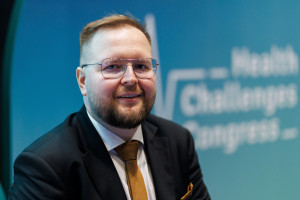Up to half of patients don't follow doctor's recommendations. There are proposed solutions.

- According to research, the problem of not following doctor's recommendations regarding medication and lifestyle may affect up to 50% of patients
- The Parliamentary Adherence Team operating in the Senate is working on this issue and is expected to soon present ready-made solutions in several areas, including health education and training of medical staff, and digitalization.
- According to experts, the issue of adherence must also be taken into account by the National Health Fund, which should additionally finance these activities as part of health care services.
These same patients, who wait months in long lines to see specialists, often fail to purchase medications or take their dosages as prescribed. They also fail to adhere to other recommendations, such as diet or physical activity, that are part of the treatment process. Research shows that the problem is enormous, potentially affecting up to 50% of patients . The Senate's Parliamentary Adherence Team is addressing this issue, tasked with diagnosing the causes and developing solutions.
"Doctors are convinced that their patients take everything to heart"- In September, our team's subgroups on health education and training, access to medical records, and pharmacists will meet with representatives of the Ministry of Health and lawyers to jointly establish specific solutions regarding adherence - announced its chairwoman, Senator Beata Małecka-Libera , at a meeting of the Parliamentary Group on Adherence.
Prof. Przymysław Kardas from the Department of Family Medicine of the Medical University of Lodz recalled his proposal for changes in this area.
" Chronic diseases, because they are the main focus of adherence to therapeutic recommendations, require systematic treatment . This knowledge is lacking in society. This is natural, as people entering middle age or older bring to their new health reality previous experiences stemming from the treatment of acute illnesses, such as infections, where the goal is cure, not lifelong medication," said Professor Kardas.
"An additional complication may be the fact that these diseases are often asymptomatic. Hypertension is an example. Therefore , extensive educational programs are needed, targeted at middle-aged and older people, who should be made aware of the benefits of systematic treatment. My proposal is a campaign planned for five years, with spring and fall editions each year," he added.
As he pointed out, the second line of action concerns medical professionals, with the primary focus being on those already operating in the market, such as physicians, community nurses, and pharmacists. Training those who are just entering the market is also advisable.
Professor Kardas also cited the results of research conducted by the Medical University of Lodz. It shows that doctors are convinced that the patients they treat take their recommendations to heart. Of course, there are those who don't follow their recommendations, but these are patients of other doctors.
Changes in medical education"This belief has little to do with reality, as nearly half of patients don't follow doctor's recommendations. Therefore, knowledge on this topic—from theory to specific practical solutions—is crucial for medical staff. A doctor should not only be able to recognize a patient who isn't following their recommendations, but also have specific recommendations for them ," argued Professor Kardas.
The Chairwoman of the National Section of Pharmaceutical Law of the Polish Pharmaceutical Society , Professor Agnieszka Zimmermann, drew attention to aspects related to education.
"It's important that the student curriculum is consistent for all medical professionals. Currently, the standards for educating physicians and pharmacists are disconnected, but if medical professionals are to be educated in a uniform manner, identical learning outcomes must be established . Our proposals provide examples of such outcomes, which should be the same across various fields of study. This will enable the implementation of interprofessional education and help build a completely new quality in pharmacology teaching," the expert argued.
"The National Health Fund must take note of the issue of adherence""Postgraduate education, in turn, needs modules on communication skills with patients and their families, but also within the therapeutic team. Due to the overload of programs and the overload of students and academics, all of this should be done without adding new subjects or additional hours, but rather as a modification of what we already do," she added.
Prof. Janusz Heitzman , Vice President of the Polish Psychiatric Association and member of the Mental Health Council, emphasized that patients must be aware that the success of the treatment process depends on their attitude. In his opinion, the National Health Fund (NFZ) should also recognize the issue of adherence and additionally finance these activities as part of healthcare services .
Prof. Agnieszka Tycińska from the Clinic of Cardiology and Internal Medicine with the Department of Intensive Cardiac Supervision of the Medical University of Białystok appealed for the integration of Electronic Medical Records with the Online Patient Card.
"These two excellent tools are currently underutilized. They could also be integrated with devices the patient already has at home, such as a glucometer, which would allow for the generation of alerts. A digital treatment plan is also needed, accessible to both the patient and the doctor. The plan could also be used to monitor the quality of care," the professor pointed out.
rynekzdrowia











